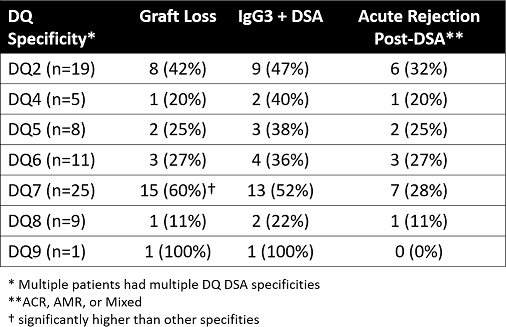All DQ DSA May Not Be Equal: Comparing Outcomes between De Novo DQ DSA Specificities
1Terasaki Research Institute, Los Angeles
2East Carolina University, Greenville, NC
3Vidant Medical Center, Greenville, NC
4Eastern Nephrology Associates, Greenville, NC.
Meeting: 2018 American Transplant Congress
Abstract number: 514
Keywords: Alloantibodies, Kidney transplantation
Session Information
Session Name: Concurrent Session: Kidney Complications: Antibody & Late Outcomes
Session Type: Concurrent Session
Date: Tuesday, June 5, 2018
Session Time: 4:30pm-6:00pm
 Presentation Time: 5:42pm-5:54pm
Presentation Time: 5:42pm-5:54pm
Location: Room 4B
It is not known if development of de novo DSA (dnDSA) to different HLA-DQ mismatches (serological) are associated with equal risk to a patient's allograft outcomes. In a cohort of 69 kidney transplant patients with anti-DQ dnDSA and no other dnDSA (i.e Class I HLA or HLA-DR), we compared risk between DQ dnDSA specificities.
METHODS: We performed a retrospective analysis de novo DSA positive transplant patients transplanted at a single transplant center between 9/1999 and 12/2010. All patients underwent serial HLA IgG antibody monitoring by LABScreen® single antigen beads post-transplant and 1, 3, 6, 12 months, and biannually thereafter. IgG3 testing was conducted via single antigen beads. All patients were DSA negative at time of transplantation.
RESULTS: In the 69 patients with DQ dnDSA (only) at dnDSA onset, we detected 78 DQ DSAs. Nine patient had two DQ dnDSAs. The majority of the DSAs were DQ7 dnDSA (32%) followed by dnDSA to DQ2 (24%), DQ6 (11%), DQ8 (12%), DQ5 (10%), DQ4 (6%), and DQ9 (1%). Within the 69 patients, DQ7 had a significantly higher rate of graft loss compared to the other DQ DSA (p=0.007). (Table). In rank order, graft failure rates per DQ dnDSA were DQ7 (60%), DQ2 (42%), DQ6 (27%), DQ5 (25%). All others DQs only had one case of graft failure each. Similarly, rates of IgG3 DSA and acute rejection after DSA were more common in the DQ7, DQ2, and DQ6 cases (Table).
CONCLUSIONS: These findings suggest that all DQ DSA are not equal. Larger patient analysis and a further research will be necessary to better understand the potential differences between dnDSA against different DQ mismatches.
Table: Outcomes and characteristics by DQ dnDSA specificity.
CITATION INFORMATION: Everly M., Briley K., Nguyen A., Jucaud V., Maldonado A., Haisch C., Bolin P., Kendrick S., Jones H., McLawhorn K., Leeser D., Rebellato L. All DQ DSA May Not Be Equal: Comparing Outcomes between De Novo DQ DSA Specificities Am J Transplant. 2017;17 (suppl 3).
To cite this abstract in AMA style:
Everly M, Briley K, Nguyen A, Jucaud V, Maldonado A, Haisch C, Bolin P, Kendrick S, Jones H, McLawhorn K, Leeser D, Rebellato L. All DQ DSA May Not Be Equal: Comparing Outcomes between De Novo DQ DSA Specificities [abstract]. https://atcmeetingabstracts.com/abstract/all-dq-dsa-may-not-be-equal-comparing-outcomes-between-de-novo-dq-dsa-specificities/. Accessed February 20, 2026.« Back to 2018 American Transplant Congress

